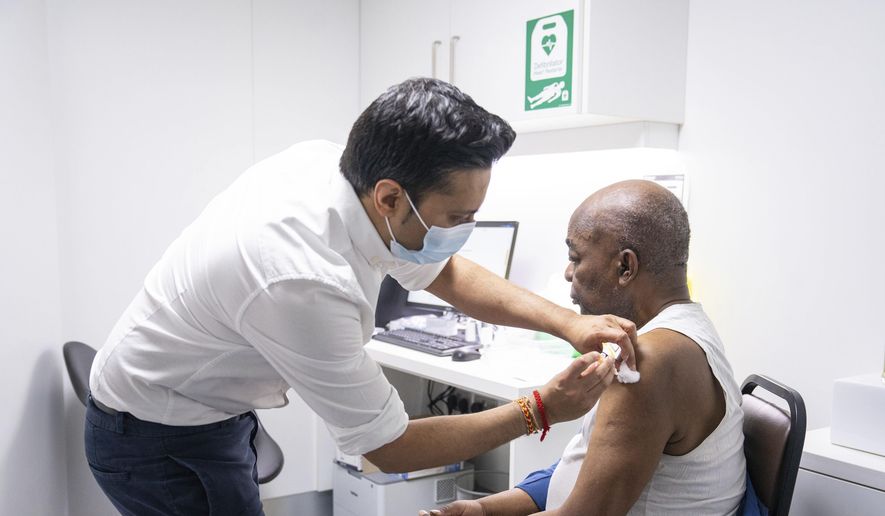The AstraZeneca coronavirus vaccine reduced transmission in addition to staving off disease — a novel finding — and achieved better results when a second dose was given 12 weeks later instead of four, researchers at Oxford University said Wednesday.
University researchers said they regularly tested participants in a trial in Britain and found a 67% reduction in positive readings compared to the placebo group.
Scientists had figured that COVID-19 vaccines slowed the spread of the virus, beyond stiff-arming disease, but were waiting on better data.
The Oxford study underscores the need for widespread vaccination to control the pandemic, especially among asymptomatic people who don’t realize they are infected and transmit the virus in the community.
Also, Oxford researchers found the AstraZeneca vaccine was 76% effective against disease after a single dose and that protection increased to 82% when the second dose was given at 12 weeks, compared to only 55% if given less than six weeks apart.
It wasn’t clear why the latter group had a lower efficacy reading than after a single dose. Experts said the paper was written in a way that it wasn’t clear if the same people were tested in each group or if the number of people in each group differed.
For now, the company says the 12-week span seems to work best.
That’s good news for Britain and other countries that are delaying the second dose of the AstraZeneca vaccine to get first doses in the arms of more people while manufacturing ramps up.
“In the four-to-12 week interval that has been approved by regulators around the world, being toward the end of that interval — toward the 12 weeks — you get better efficacy. The longer we leave it, the better it is,” said Sir Mene Pangalos, the company’s executive vice president for biopharmaceuticals. “We feel that 12 weeks is a good interval for us in terms of when you administer the second dose.”
While promising news, the vaccine probably won’t be available in the U.S. for several weeks as it is still being tested in the U.S. population. Evidence that second doses should be given up to three months later will not upend America’s strategy with existing vaccines.
The vaccines from Pfizer-BioNTech and Moderna use a different platform — messenger RNA — than AstraZeneca’s adenovirus vector.
The Food and Drug Administration approved them for emergency use based on trial data that found a second dose, delivered 21 days later for Pfizer or 28 days for Moderna, would produce roughly 95% efficacy.
“We certainly respect that the U.K. scientists and health officials are going by their data, and letting their own data for their own platform dictate their policy,” Dr. Anthony Fauci, director of the National Institute of Allergy and Infectious Diseases, said in a White House COVID-19 briefing Wednesday. “The question is asked, often, ‘Then why don’t we do the same thing with our candidates that are being distributed to people in the United States?’ And the response is simple: We also are going very much by the data and science that has emanated out of very large clinical trials.
“We feel strongly we will go by the science, which has dictated for us the optimal way to get the 94% to 95% response,” he said.
Dr. Fauci said under “special circumstances,” in which the second dose of the mRNA vaccines cannot be given on the correct day, it is better to deliver it a few weeks later than not at all.
U.S. regulators in the coming days are expected to review a vaccine from Johnson & Johnson that is delivered in one dose, eliminating the need to juggle return visits and second-dose supply.
The AstraZeneca is poised to seek U.S. approval by early March, after it gets the results of a 30,000-person trial in the states. The trial ran into hiccups last year, after reports of an adverse reaction in Britain forced a multi-week pause in the American study, but it is fully enrolled now.
Sir Pangalos said the U.S. study looks at a four-week dosing interval, though he wants American regulators “to be informed” by company data on different dosing intervals tested in other countries.
“We think it will be the totality of that package that hopefully ultimately informs the rollout and implementation of the vaccine,” he said. “But in terms of getting an approval, we do think we will need that U.S. data.”
Experts say that might pose a challenge for the FDA, which generally prefers things like AstraZeneca’s dosing options to be demonstrated in a single phase 3 trial instead of multiple strands. The smorgasbord of options being tested in Britain and elsewhere are largely a result of officials finding ways to maximize the limited global supply of vaccines, as the coronavirus exacts a hefty toll.
“It shows that in a pandemic, when things get in short supply, you’d like to have more options,” said Arthur Caplan, director of the division of medical ethics at the New York University Grossman School of Medicine. “That isn’t something the FDA regulates for.”
• Tom Howell Jr. can be reached at thowell@washingtontimes.com.




Please read our comment policy before commenting.